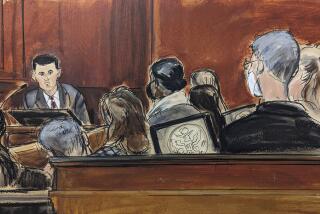Greenspan Defends Fed’s Rescue of Hedge Fund
- Share via
WASHINGTON — Federal Reserve Board Chairman Alan Greenspan defended the Fed’s role in brokering a rescue of Long-Term Capital Management last month, saying Thursday that failure of the $80-billion-plus investment fund could have severely disrupted world markets and damaged “the economies of many nations, including our own.”
But skeptical members of the House Banking Committee peppered Greenspan and William J. McDonough, president of the New York Federal Reserve Bank, with questions about why government regulators didn’t know much sooner that the fund was in deep trouble and that some of the nation’s largest banks and brokerage firms would suffer very large losses if it went under.
Indeed, Merrill Lynch & Co. and Bankers Trust Corp., two of the companies involved in the rescue, on Thursday announced their exposure to all such hedge funds--unregulated investment funds organized for large, savvy investors.
Merrill said its total hedge fund exposure is $2.08 billion, including $1.4 billion in loans to Long-Term Capital. Bankers Trust said hedge funds owe it $875 million. But both Merrill and Bankers Trust said the vast majority of their loans are secured by collateral such as Treasury securities.
BankAmerica Corp., which on Wednesday became the nation’s biggest bank upon merging with NationsBank Corp., said it has less than $300 million in loans outstanding to hedge funds and that the loans are secured.
House Banking Committee Chairman Rep. Jim Leach (R-Iowa) acknowledged that failure of Long-Term Capital would have posed a risk for markets, but he labeled the episode a “fiasco.”
Leach and several other members suggested that additional regulatory powers might be needed, either by the Fed or other agencies, to prevent such situations from occurring.
However, Greenspan and McDonough said no additional powers are needed and that direct regulation of hedge funds isn’t feasible. If it were attempted, the funds could easily leave the country, the officials said.
As for the Fed’s help in arranging Long-Term Capital’s bailout, deciding whether the potential disruption in this case was severe enough for the Fed to become involved “is among the most difficult judgments that ever confront a central banker,” Greenspan said.
Bloomberg News was used in compiling this report.
More to Read
Inside the business of entertainment
The Wide Shot brings you news, analysis and insights on everything from streaming wars to production — and what it all means for the future.
You may occasionally receive promotional content from the Los Angeles Times.










